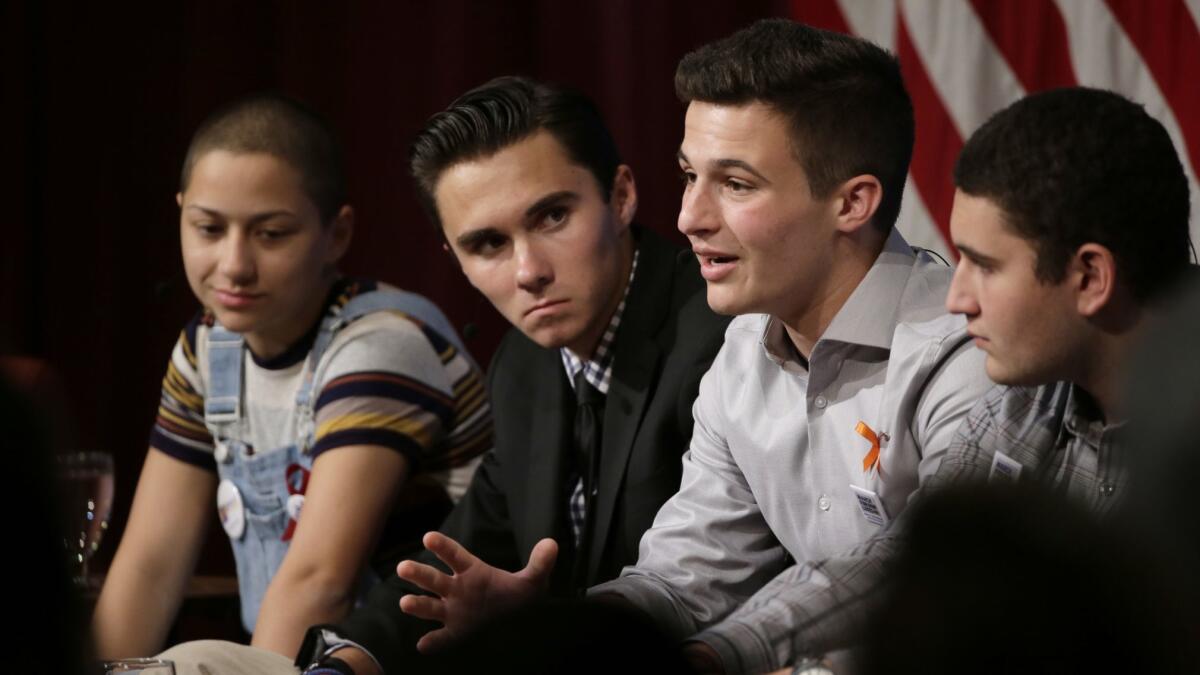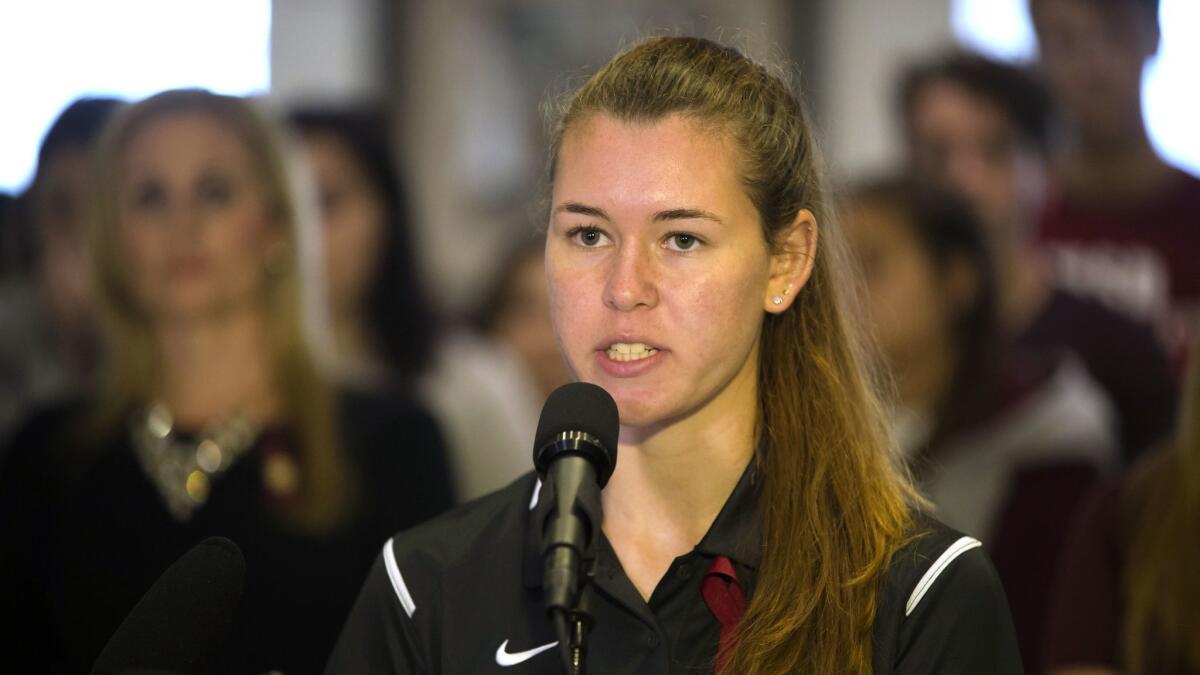Sensing their moment, Florida students balance school and activism planning the March for Our Lives
- Share via
Reporting from PARKLAND, FLA. — A self-confessed “secret huge nerd,” Jaclyn Corin admits she is freaking out on the inside as she tries to balance political activism with schoolwork.
The 17-year-old junior class president has six essays to write for her advanced-placement language and composition class. But after a gunman rampaged through her high school, killing 14 students and three staff members, she is mostly focused on Saturday’s March for Our Lives.
“It’s very hard to juggle,” Jaclyn said one evening last week as she slipped into a booth at Panera with fellow activists David Hogg and Sarah Chadwick and sipped a strawberry banana smoothie.
“We’re teenagers and we’re leading a national movement,” said David, also 17, a wiry, intense senior who has put on the back burner memorizing his 50 psychology vocab words and his environmental science project on mammals. “That’s a lot of stress.”
The goal of the student-led march in Washington is simple: to demand that Congress pass a comprehensive bill to address gun violence.
While the House last week passed the STOP School Violence Act, which authorizes $50 million a year to bolster school security, students say it does nothing to restrict gun access. It does not even mention the word “gun.”
“We need a mass mobilization of the American public on a huge scale,” said David, a budding filmmaker who became a key voice of the movement after recording video of his classmates huddling in a small dark closet during the Feb. 14 shooting.
About 1,000 students from Marjory Stoneman Douglas High School in Parkland — and hundreds of thousands of supporters from across the country — plan to march on the nation’s Capitol. More than 800 marches are planned worldwide — in Los Angeles and Paris; Buenos Aires and Tokyo; Sydney, Australia, and Mumbai, India.
“In the period of one month, we have shaken up the world,” said Jaclyn, a small blonde with a chirpy, singsong voice. “But I feel like the adults keep pressing the snooze button. At some point they’re going to have to wake up.”
Trying to persuade politicians to enact gun legislation, David said, is about as frustrating as instructing adults how to use smartphones.
“You know, when they’re like, ‘I can’t figure out how to take a selfie…,’” he said dryly. “And then five minutes later, you finally take the phone and you just press the button… You just need to go into the settings!”
“That’s perfect,” Jaclyn said, giggling.
“That’s what we’re doing with our government,” David continued. “‘Goddammit, just give it to me!’”

Already, the students have raised more than $3.3 million via GoFundMe to stage the event, bringing in major donations from celebrities such as Oprah Winfrey, Steven Spielberg and George and Amal Clooney. A string of pop stars — Ariana Grande, Miley Cyrus, Jennifer Hudson and Demi Lovato — agreed to perform at their rally.
For the organizers, the march is a way to channel their grief and anger as well as send a strong message to President Trump and Congress.
“We know this is what’s going to help us heal,” said Delaney Tarr, a 17-year-old senior. “But it’s also bigger than us.… I think everybody, they want to make the world a different place, and that’s what we’re working on right now — we have an opportunity to do something.”
The students feel a sense of urgency in getting their message out, a fear that the public will lose interest.
Sarah, a wry 16-year-old junior who has become celebrated for her adept use of social media, went on Twitter hours after the shooting with a raw, pointed message for Trump. “I don’t want your condolences you...,” she wrote, adding an obscenity for emphasis. “My friends and teachers were shot.”
Around the same time, Jaclyn, who lost her friend Joaquin Oliver, made a plea on Instagram: “PLEASE contact your local and state representatives, as we must have stricter gun laws IMMEDIATELY.”
As Jaclyn urged students to join her in Tallahassee, the state capital, to lobby for new gun laws in Florida, her friend Cameron Kasky, a 17-year-old junior and theater kid, pulled the activists together by creating the #NeverAgain hashtag and coming up with the idea of a march.
In a matter of days, the teenagers had created a national movement with a goal of tighter background checks for gun buyers. After delivering a powerful “We call B.S.” speech at a rally in Fort Lauderdale, Emma Gonzalez, 18, amassed 1.25 million Twitter followers.
Within just three weeks, they pushed Florida’s largely Republican Legislature to pass, and Republican Gov. Rick Scott to sign, a landmark $400-million school safety bill. It didn’t go as far as students wanted, but included provisions long opposed by the National Rifle Assn., such as increasing the minimum age to purchase a firearm from 18 to 21.
Some critics dismiss the teenagers as telegenic, overly emotional mouthpieces for adults, yet the students are quick to reject the idea that anyone is steering them.
“Nobody is setting our agenda for us,” said David, who adds that he has worried from the start that adults would try to take over. “If they try to, Cameron, Emma and I verbally eviscerate them.”
Still, the students have happily left much of the day-to-day planning of the march to sympathetic parents, teachers, alumni, legislators and nonprofit groups.
Deena Katz, co-executive producer of “Dancing With the Stars” and co-executive director of the Women’s March Los Angeles Foundation, is working on permits and organizing the route, Jumbotrons, generators, porta-potties and security. A public relations firm is coordinating the students’ speaking engagements and fielding media requests.
A batch of 200 students and faculty will travel to the capital for a four-day trip sponsored by Giffords, the gun violence prevention organization founded by Gabrielle Giffords, the Democratic former Arizona congresswoman who survived a 2011 assassination attempt. An additional 550 students will fly up for the day, boarding predawn flights provided complimentary by Delta Air Lines.
The teens accept that they are having an impact partly because they have resources that other shooting victims do not; Parkland is an affluent, predominantly white community, with a median household income of around $128,000.

“If we can use our white privilege to amplify the voice of minorities, we have to,” Sarah said. “It’s not just us experiencing violence. We experienced it once, and it was horrible and traumatizing. But people in neighborhoods in inner-city communities experience shootings every single day.”
As activists, the students are not in lockstep on every policy issue. They differ on whether teachers should be armed or whether to push for an outright ban on assault weapons. When prosecutors announced last week they would seek the death penalty for the shooter, Nikolas Cruz, Emma indicated on CBS’ “60 Minutes” she would be happy to see him put to death, while Cameron and David said they would prefer he spend life in prison.
Some, like Jaclyn, admit they were not politically active before the shooting. Many of the others, however, say they have long followed politics and news. After last year’s Las Vegas shooting that left 58 people dead, Sarah tweeted messages calling for more gun control.
“I’ve always been opinionated, but now people are listening,” she said, noting her parents set up Twitter accounts after the shooting at her school to check up on her.
“Every day, politics is used to suppress you,” said David, who says he learned most of what he knows about the NRA and special interest groups from watching comedian John Oliver on HBO’s “Last Week Tonight.” “I always felt this way. Now I have the platform to speak out.”
As if on cue, a man waves at David — one of a string of starstruck adults who approach the teens every few minutes to give high-fives, thank them and wish them luck.
Already, the teenagers worry about how they will keep up momentum after the March for Our Lives is over.
“I’m going to be BoJack Horseman,” David deadpanned, referring to the jaded, washed-up, alcoholic horse and eponymous hero of Netflix’s animated adult comedy. “What we really need to figure out is what the hell is going to happen on March 25 and the day after that and the day after that.”
“We don’t want people to forget about us,” Sarah agreed. “But I think that’s going to be hard to do. We now have a massive following, especially Emma.”
Considering how to push their agenda forward, David referred to German novelist Gustav Freytag’s pyramid of storytelling.
“We have the exciting incident, we have the buildup, and we have the climax, but there’s no resolution,” he said. “The resolution is the thing that we’re fighting for, and that’s our lives.”
Jarvie is a special correspondent.
More to Read
Sign up for Essential California
The most important California stories and recommendations in your inbox every morning.
You may occasionally receive promotional content from the Los Angeles Times.














